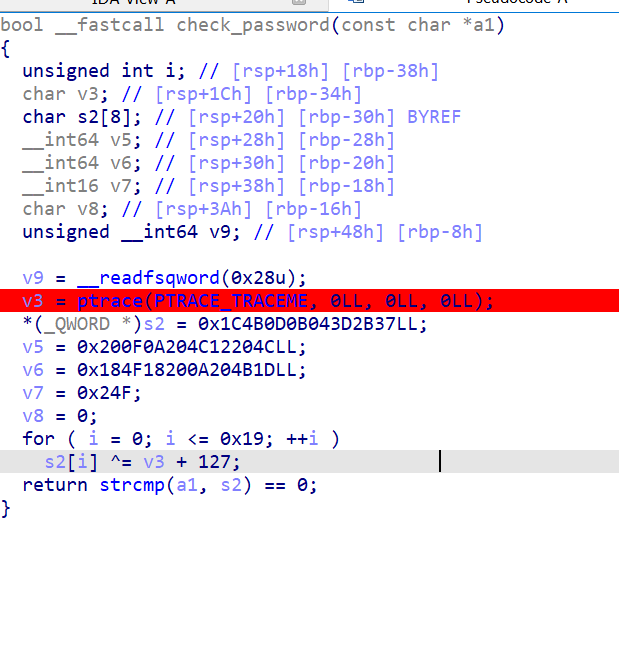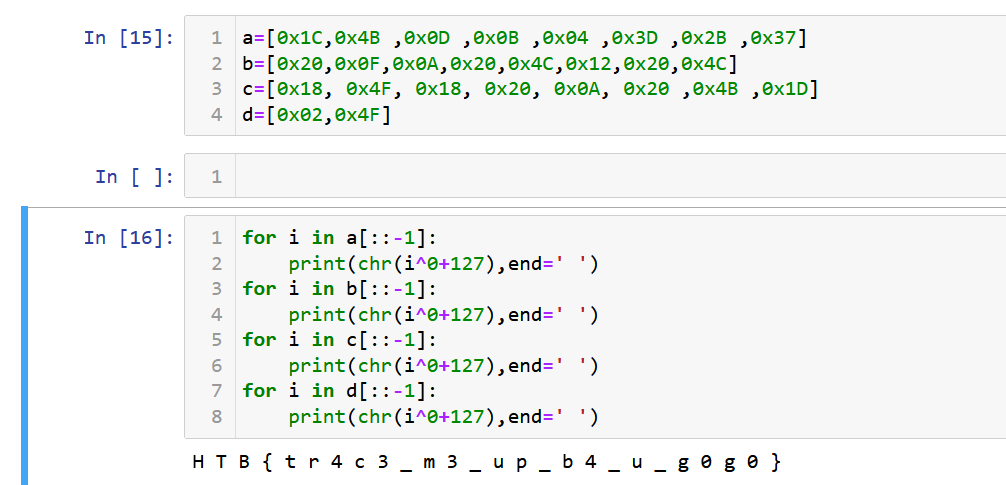Without a Trace Reverse
Without a Trace Reverse

Draeger’s mothership has suddenly vanished, he could be readying an attack! You need to track him down before disaster strikes…
This challenge is easy as well.
we look at the check_password function and see that the password is compared with the block of hex initialized above. The ptrace should return 0 if the process is not being debugged.


H T B { t r 4 c 3 _ m 3 _ u p _ b 4 _ u _ g 0 g 0 } This should be the moment to read up on the ptrace function. https://man7.org/linux/man-pages/man2/ptrace.2.html Ptrace is a system call that one process can use to observe another one. The most important parameters are: On success, ptrace() shall return the requested data for PTRACE_PEEK requests, or zero for all other requests. On error, all requests return -1. So in our case if the process is not being debugged returns 0.
PTRACE_TRACEME
Indicate that this process is to be traced by its parent.
A process probably shouldn't make this request if its
parent isn't expecting to trace it. (pid, addr, and data
are ignored.)
The PTRACE_TRACEME request is used only by the tracee; the
remaining requests are used only by the tracer. In the
following requests, pid specifies the thread ID of the
tracee to be acted on. For requests other than
PTRACE_ATTACH, PTRACE_SEIZE, PTRACE_INTERRUPT, and
PTRACE_KILL, the tracee must be stopped.
PTRACE_PEEKTEXT, PTRACE_PEEKDATA
Read a word at the address addr in the tracee's memory,
returning the word as the result of the ptrace() call.
Linux does not have separate text and data address spaces,
so these two requests are currently equivalent. (data is
ignored; but see NOTES.)
PTRACE_PEEKUSER
Read a word at offset addr in the tracee's USER area,
which holds the registers and other information about the
process (see <sys/user.h>). The word is returned as the
result of the ptrace() call. Typically, the offset must
be word-aligned, though this might vary by architecture.
See NOTES. (data is ignored; but see NOTES.)
PTRACE_POKETEXT, PTRACE_POKEDATA
Copy the word data to the address addr in the tracee's
memory. As for PTRACE_PEEKTEXT and PTRACE_PEEKDATA, these
two requests are currently equivalent.
PTRACE_POKEUSER
Copy the word data to offset addr in the tracee's USER
area. As for PTRACE_PEEKUSER, the offset must typically
be word-aligned. In order to maintain the integrity of
the kernel, some modifications to the USER area are
disallowed.
PTRACE_GETREGS, PTRACE_GETFPREGS
Copy the tracee's general-purpose or floating-point
registers, respectively, to the address data in the
tracer. See <sys/user.h> for information on the format of
this data. (addr is ignored.) Note that SPARC systems
have the meaning of data and addr reversed; that is, data
is ignored and the registers are copied to the address
addr. PTRACE_GETREGS and PTRACE_GETFPREGS are not present
on all architectures.
PTRACE_GETREGSET (since Linux 2.6.34)
Read the tracee's registers. addr specifies, in an
architecture-dependent way, the type of registers to be
read. NT_PRSTATUS (with numerical value 1) usually
results in reading of general-purpose registers. If the
CPU has, for example, floating-point and/or vector
registers, they can be retrieved by setting addr to the
corresponding NT_foo constant. data points to a struct
iovec, which describes the destination buffer's location
and length. On return, the kernel modifies iov.len to
indicate the actual number of bytes returned.
PTRACE_SETREGS, PTRACE_SETFPREGS
Modify the tracee's general-purpose or floating-point
registers, respectively, from the address data in the
tracer. As for PTRACE_POKEUSER, some general-purpose
register modifications may be disallowed. (addr is
ignored.) Note that SPARC systems have the meaning of
data and addr reversed; that is, data is ignored and the
registers are copied from the address addr.
PTRACE_SETREGS and PTRACE_SETFPREGS are not present on all
architectures.
PTRACE_SETREGSET (since Linux 2.6.34)
Modify the tracee's registers. The meaning of addr and
data is analogous to PTRACE_GETREGSET.
PTRACE_GETSIGINFO (since Linux 2.3.99-pre6)
Retrieve information about the signal that caused the
stop. Copy a siginfo_t structure (see sigaction(2)) from
the tracee to the address data in the tracer. (addr is
ignored.)
Comments